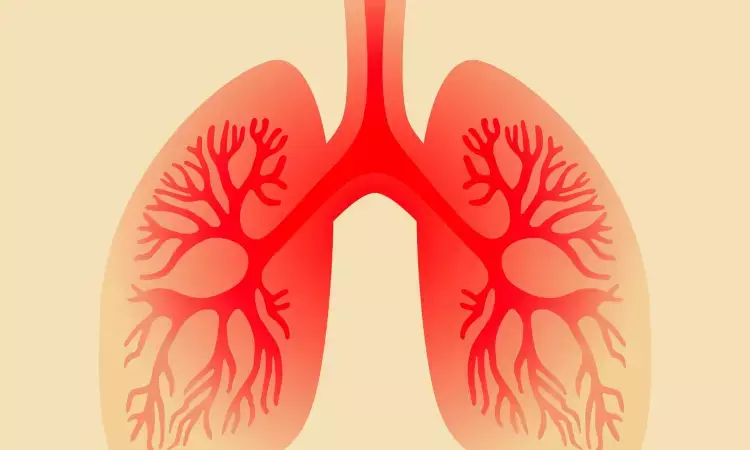- Home
- Medical news & Guidelines
- Anesthesiology
- Cardiology and CTVS
- Critical Care
- Dentistry
- Dermatology
- Diabetes and Endocrinology
- ENT
- Gastroenterology
- Medicine
- Nephrology
- Neurology
- Obstretics-Gynaecology
- Oncology
- Ophthalmology
- Orthopaedics
- Pediatrics-Neonatology
- Psychiatry
- Pulmonology
- Radiology
- Surgery
- Urology
- Laboratory Medicine
- Diet
- Nursing
- Paramedical
- Physiotherapy
- Health news
- Fact Check
- Bone Health Fact Check
- Brain Health Fact Check
- Cancer Related Fact Check
- Child Care Fact Check
- Dental and oral health fact check
- Diabetes and metabolic health fact check
- Diet and Nutrition Fact Check
- Eye and ENT Care Fact Check
- Fitness fact check
- Gut health fact check
- Heart health fact check
- Kidney health fact check
- Medical education fact check
- Men's health fact check
- Respiratory fact check
- Skin and hair care fact check
- Vaccine and Immunization fact check
- Women's health fact check
- AYUSH
- State News
- Andaman and Nicobar Islands
- Andhra Pradesh
- Arunachal Pradesh
- Assam
- Bihar
- Chandigarh
- Chattisgarh
- Dadra and Nagar Haveli
- Daman and Diu
- Delhi
- Goa
- Gujarat
- Haryana
- Himachal Pradesh
- Jammu & Kashmir
- Jharkhand
- Karnataka
- Kerala
- Ladakh
- Lakshadweep
- Madhya Pradesh
- Maharashtra
- Manipur
- Meghalaya
- Mizoram
- Nagaland
- Odisha
- Puducherry
- Punjab
- Rajasthan
- Sikkim
- Tamil Nadu
- Telangana
- Tripura
- Uttar Pradesh
- Uttrakhand
- West Bengal
- Medical Education
- Industry
Tezepelumab novel therapeutic approach in uncontrolled severe non-type 2 asthma, case study suggests

Japan: A recent case study published in Respirology Case Reports has shown that Tezepelumab could serve as a novel therapy for patients with uncontrolled severe non-type 2 asthma despite having bronchial thermoplasty (BT) and prior treatment with biologics.
The data resulted from a new case report concerning an 80-year-old female with non-type 2 asthma, which had progressively gotten worse and had been diagnosed 11 years prior.
"This is the first case of a patient who did not respond to sequential bronchial thermoplasty, dupilumab, benralizumab, and mepolizumab but presented with good clinical response to tezepelumab. Therefore, tezepelumab may be useful for patients with non-type 2 asthma," the investigators wrote.
Severe asthma affects about 5%–10% of patients with asthma. Tezepelumab is a human IgG2 monoclonal antibody characterized by its inhibition of thymic stromal lymphopoietin (TSLP). Tezepelumab can be effective in patients with poorly controlled moderate to severe asthma regardless of phenotype (type 2 or non-type 2). Yoshiro Kai, Minami-Nara General Medical Center, Yoshino-gun, Japan, and colleagues describe a case of non-type 2 asthma that progressively worsened over the years. Non-type 2 severe asthma developed during tezepelumab treatment after failed treatment with BT, dupilumab, benralizumab, and mepolizumab.
The case is of an 80-year-old woman, labeled as a ‘never-smoker’ and was diagnosed with asthma 11 years ago. The patient was shown not to have comorbid eosinophilic chronic rhinosinusitis and was also sensitive to receiving aspirin.
She experienced repeated exacerbations needing treatment with systemic corticosteroids despite therapy with medications including high-dose inhaled corticosteroids/long-acting beta-agonists plus long-acting muscarinic antagonists. The patient presented with non-eosinophilic asthma.
The patient was initially treated with bronchial thermoplasty, which was only effective for one year. Treatment with bronchial thermoplasty, dupilumab, benralizumab, and mepolizumab was ineffective. The fourth treatment, which included tezepelumab, was initiated.
There was a significant improvement in the patient's quality of life and symptoms.
The research team noted that eosinophils are an essential part of asthma pathogenesis, adding that dupilumab, mepolizumab, and benralizumab are considered to be useful for Th2-severe asthma treatment. However, due to low eosinophil counts and FeNO levels, the team added that ineffective suppression of IL-13 and IL-5 may have occurred in this case.
In conclusion, Tezepelumab treatment might be a novel therapeutic approach in patients with uncontrolled severe non-type 2 asthma despite BT and previous biologic treatments with dupilumab, benralizumab, and mepolizumab.
"Nevertheless, there is a need to perform further studies evaluating the efficacy and safety of tezepelumab against uncontrolled severe non-type 2 asthma," the research team concluded.
Reference:
Kai Y, Suzuki K, Kataoka R, Sato I, Tamaki S, Muro S. Efficacy of tezepelumab against uncontrolled severe non-type 2 asthma refractory to bronchial thermoplasty, benralizumab, dupilumab, and mepolizumab. Respirol Case Rep. 2024 Feb 27;12(3):e01311. doi: 10.1002/rcr2.1311. PMID: 38420113; PMCID: PMC10898956.
Dr Kamal Kant Kohli-MBBS, DTCD- a chest specialist with more than 30 years of practice and a flair for writing clinical articles, Dr Kamal Kant Kohli joined Medical Dialogues as a Chief Editor of Medical News. Besides writing articles, as an editor, he proofreads and verifies all the medical content published on Medical Dialogues including those coming from journals, studies,medical conferences,guidelines etc. Email: drkohli@medicaldialogues.in. Contact no. 011-43720751


